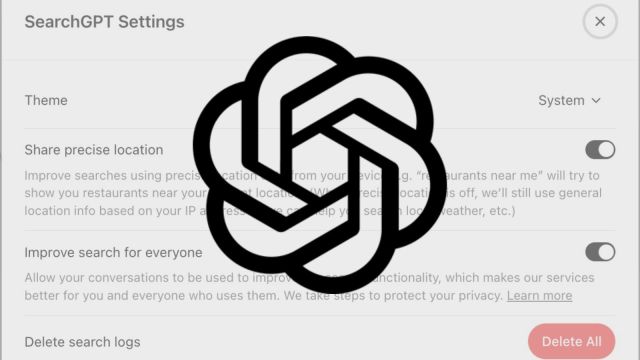OpenAI previews SearchGPT: What data will it have on you and how to delete it?
With OpenAI's SearchGPT, who will have access to your search queries? Can anyone see what you search for on the internet?
 OpenAI has only offered limited access to SearchGPT for now. (Express Image/OpenAI)
OpenAI has only offered limited access to SearchGPT for now. (Express Image/OpenAI)Ending months of speculation, OpenAI on Thursday, July 25, officially announced a prototype of its AI-powered search product called SearchGPT.
The first look of the SearchGPT prototype indicates that users will be able to search for information on the internet by entering their queries such as ‘Will it be hot today?’ or ‘music festivals in 2024’. “SearchGPT will quickly and directly respond to your questions with up-to-date information from the web while giving you clear links to relevant sources,” OpenAI said in a blog post.
Currently, only a small group of 10,000 users and publishers will be able to give SearchGPT a try. Aside from sharing details about its latest AI offering, OpenAI also laid out its approach to ensuring data privacy in the context of SearchGPT.
What kind of data is collected and shared by SearchGPT?
OpenAI has said that general location information of SearchGPT users, such as their IP addresses, will be collected and shared with third-party search providers in order to provide more accurate results to your search queries.
It also said that the search queries posed by users may also be shared with third-party entities after de-identification.
Will data be shared between OpenAI’s services?
Besides SearchGPT, OpenAI is also behind other AI services such as ChatGPT, Sora, DALL-E, and more. So, what are the chances that your data will be shared just among OpenAI’s tools?
As part of its data privacy policy, OpenAI said that it will draw a line between the search history of SearchGPT and ChatGPT conversation history. However, that doesn’t mean there will be zero integration between the two as OpenAI plans to bring some of SearchGPT’s best features to the popular chatbot in the future.
 Furthermore, OpenAI has indicated that SearchGPT data will not be used to train its generative AI foundation models like GPT-4o. But websites that have opted out of generative AI training may still show up in the search results provided by SearchGPT.
Furthermore, OpenAI has indicated that SearchGPT data will not be used to train its generative AI foundation models like GPT-4o. But websites that have opted out of generative AI training may still show up in the search results provided by SearchGPT.
What are the options available for users?
OpenAI said SearchGPT will be able to give you better results if you choose to share more precise location information with the AI search engine. But what if you don’t want to? In that case, users have the option to not share their precise location information.
They will be able to disable it by clicking on the profile icon, choosing Settings, and toggle off the precise location setting. If you’re accessing SearchGPT via Chrome, you can disable precise location sharing from the browser itself. Even if you’ve turned off sharing precise location information, OpenAI said that it will still collect and share general location data based on your IP address.
Users can also improve SearchGPT’s functionality by toggling ‘Improve Search’ on or off in the settings.
Can users delete their search history?
Yes, search conversations can be deleted from SearchGPT and they will further be “hard deleted” from OpenAI’s systems within 30 days. However, this does not apply to search data that’s been de-identified or stored for security/legal reasons.
Will deleted data still be used to make SearchGPT better?
Not really. “Deleting search logs will also mean that your search queries will not be used in the future to improve our search features (unless they have previously been de-identified and disassociated from your account),” OpenAI said.
So far, OpenAI’s track record with data privacy hasn’t exactly been reassuring. Recently, the ChatGPT app for MacOS was found to have a major security vulnerability which stored the user’s chats with the AI tool in plaintext, on the device. This meant that anyone with access to your device could potentially read what you’ve been asking ChatGPT, according to a report by The Verge.
Soon after the bug was reported, OpenAI released a fix that encrypted user chats with ChatGPT. Generally, OpenAI can view your conversations with ChatGPT in order to ensure user safety and train its AI models – unless you’ve opted out.







